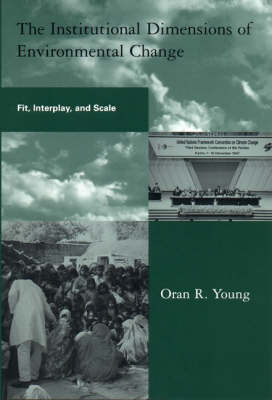Global Environmental Accord: Strategies for Sustainability and Institutional Innovation
2 total works
Researchers studying the role institutions play in causing and confronting environmental change use a variety of concepts and methods that make it difficult to compare their findings. Seeking to remedy this problem, Oran Young takes the analytic themes identified in the Institutional Dimensions of Global Environmental Change (IDGEC) Science Plan as cutting-edge research concerns and develops them into a common structure for conducting research. He illustrates his arguments with examples of environmental change ranging in scale from the depletion of local fish stocks to the disruption of Earth's climate system.Young not only explores theoretical concerns such as the relative merits of collective-action and social-practice models of institutions but also addresses the IDGEC-identified problems of institutional fit, interplay, and scale. He shows how institutions interact both with one another and with the biophysical environment and assesses the extent to which we can apply lessons drawn from the study of local institutions to the study of global institutions and vice versa. He examines how research on institutions can help us to solve global problems of environmental governance.
Substantive topics discussed include the institutional dimensions of carbon management, the performance of exclusive economic zones, and the political economy of boreal and tropical forests.
Substantive topics discussed include the institutional dimensions of carbon management, the performance of exclusive economic zones, and the political economy of boreal and tropical forests.
Analyzing International Environmental Regimes
by Helmut Breitmeier, Oran R. Young, and Michael Zurn
Published 25 August 2006
Regime theory has become an increasingly influential approach to the analysis of international relations, particularly in the areas of international political economy and international environmental politics. The conceptual appeal of the idea of "governance without government"--in which a combination of different organizations and institutions supply governance to address specific problems--reflects a world in which the demand for governance is great but the familiar mechanisms for supplying it are weak. Most research on international regimes employs qualitative methods, often using case studies to develop larger theoretical arguments; but a lack of standardization makes comparative analysis difficult. Analyzing International Environmental Regimes introduces the International Regimes Database (IRD), an important methodological innovation that allows scholars to adopt a quantitative approach to the study of international regimes.The IRD is a relational database that makes it possible to compare records on specific aspects of a number of international environmental regimes that are coded using a single, well-defined set of concepts, definitions, and scales.
The book first describes the database and discusses a number of methodological, technical, and architectural issues. It then illustrates the use of the IRD as an analytic tool, drawing on the database for descriptive statistics to evaluate theoretical ideas about compliance, decision rules, and the role of knowledge. A CD containing the full IRD data protocol and all the data currently in the database accompanies the book.
The book first describes the database and discusses a number of methodological, technical, and architectural issues. It then illustrates the use of the IRD as an analytic tool, drawing on the database for descriptive statistics to evaluate theoretical ideas about compliance, decision rules, and the role of knowledge. A CD containing the full IRD data protocol and all the data currently in the database accompanies the book.

